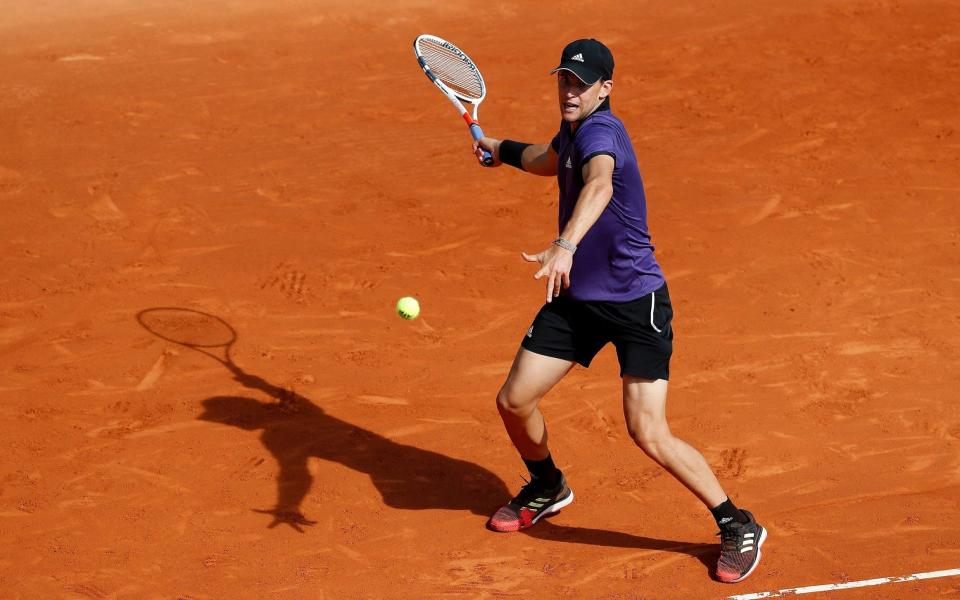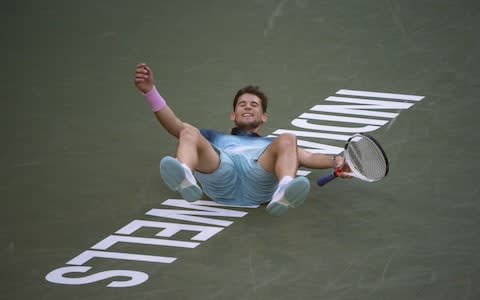Dominic Thiem exclusive interview: On his love of Chelsea, who the best footballer on tour is, and why equal pay is imperative

It is strange how tennis fame concentrates itself in so few hands. Roger Federer, Rafael Nadal and Novak Djokovic can barely leave the house without security, yet Dominic Thiem – the understated Austrian who is No 5 in the world – could walk through any British supermarket without being identified.
Thiem’s problem is that he has never won a major, despite an appearance in last year’s French Open final. Neither does he bad-mouth umpires or abuse water bottles in the manner of Nick Kyrgios. Instead he is one of tennis’s good guys: a passionate Chelsea fan who runs his own football team, as well as a rare advocate for equal pay in the men’s locker room. Plus, given the recent instability at the top of the game, he looks increasingly like a slam champion in waiting.
Thiem’s team go by the moniker “1. TFC” – which stands for First Tennis & Football Club. In Monte Carlo last week, The Daily Telegraph asked him to describe his squad. “Jurgen Melzer [the former world No 8] played already. Ernests Gulbis [who peaked at No 10] plays for us, even if he is not Austrian. My close friend Dennis Novak is there, and many guys who are ranked around 400 or 500 and also some retired players.
“All the tennis players love football and we also love to play against each other because there is not really a danger of injury. We already had 15 or 20 matches against all kinds of teams, maybe three or four a year, including the Slovenian guys a couple of times [whose number includes former “Plastic Brit” Aljaz Bedene]. The results have been pretty even.”
Thiem describes himself as a holding midfielder in the manner of Michael Essien or N’Golo Kante. He scores the odd goal, but doesn’t head the ball any more because “it’s too painful for me”. There is an Instagram clip in which he and Nadal – who swatted him aside in that Roland Garros final last year – perform skilful keepie-uppies with a tennis ball underneath the stadium court at Indian Wells. As Thiem points out: “Rafa had an uncle who played football for Spain, so he is privileged, and he has great touch in his foot. But I hear the best is Roberto Bautista Agut [the world No 21 and recent Doha champion] because he grew up playing for Villarreal.”

Thiem’s sporting sideline – “until the age of 14 I played tennis every day and football twice a week” – helps to explain his outstanding movement.
According to the leading fitness trainer Jez Green, who worked with Andy Murray for seven years: “If you haven’t played a leg sport like football or ice hockey to a high standard, it’s hard to match the best [tennis players] when it comes to leg co-ordination.”
Thiem, 25, moves particularly well on red clay, having trained on it since boyhood. So as we head towards the French Open, this time of year finds him at his most dangerous, with the slow European courts (he is the third seed in Barcelona this week) favouring his long, swooping swings.
As men’s tennis becomes less predictable, there are at least two good reasons to suspect that something special is about to happen. For one thing, Thiem won the biggest title of his career a month ago in Indian Wells. For another, he has finally taken the decision that many pundits and fans have been waiting for. In February, he dismissed his long-time coach, Gunter Bresnik. “I was only nine or 10 when I started working with Gunter,” said Thiem of Bresnik, who has coached dozens of top players including Boris Becker. “At some point it’s tough to hear all the same stuff. You know what’s coming and you know what you did wrong but still somebody’s telling you. I guess it’s the same if you are together with your partner for 20, 25 years.”
As the marital comparison suggests, their bond was far closer than that of most coaches and players, with Bresnik admitting that he spent more time with his protégé than his own children. Just to add further complexity – and perhaps awkwardness – to the situation, Thiem’s parents are both tennis coaches, and his father works at Bresnik’s academy in Vienna.

One enduring issue was Bresnik’s insistence that his client should play almost every week. Thiem set a personal record in 2015 when he entered 29 tournaments – 13 more than year-end world No 1 Djokovic. It is too early to say whether Bresnik’s replacement – the former Chilean No 1 Nicolas Massu, who won two gold medals at the Athens Olympics – has a more easy-going approach. But most observers agree that Thiem needs to pace himself with greater care, so that he can peak at the biggest events.
“It was after Australia,” said Thiem, when asked when the split had happened. “Then, with Nicolas, we had a great practice and also I was myself very positive, I was really pumped [for Indian Wells] because of this big change.”
Another regular guest in Thiem’s player box is Kristina “Kiki” Mladenovic, his girlfriend for the past two years and a key part of the France team who just won their Fed Cup semi-final in Rouen. While Elina Svitolina and Gael Monfils recently made waves with their own tennis romance, even launching an Instagram page called GEMS (their interwoven initials), they were hardly breaking new ground in a sport known for its mixed doubles.
Asked about the benefits of sharing a career with his partner, Thiem replied “It helps a lot, yes. First of all, I think I see her way more than I would see a girlfriend who didn’t play tennis, because luckily for me there are many combined tournaments. And there are many things which would be tough in a normal relationship which are easy for us.

“Travelling is our job and it’s nice to talk to someone who understands this, who understands how tough losing is and how nice winning is. But watching her play is not nice for me. I am always very nervous because I have zero influence. I don’t know she feels but I think she is also nervous [when she watches him]. It’s normal, I would say.”
So what about equal pay? The men’s game is awash with chauvinism.
Dissatisfaction with combined events is rife, and could be seen as one of the silent drivers behind the recent political assassination of Association of Tennis Professionals President Chris Kermode. For Thiem, though, this is a principle worth defending.
“There are some things which are tough to discuss,” he said. “But I am fully into her practice schedule and I know how hard she works, how many hours she puts in, the same like all the men. I think it’s good that they have equal prize money. Of course they don’t play best-of-five sets, have some easy matches sometimes in the beginning of big tournaments. She would like to [play best of five], this I know.”
Few male players are so open-minded. There may be an “I” in Thiem – contradicting a football cliché – but this tennis champion is an unassuming as they come.

